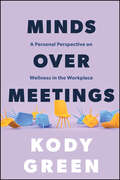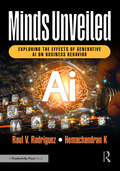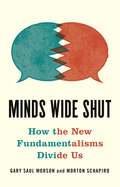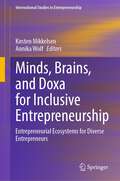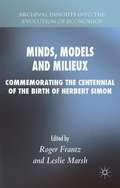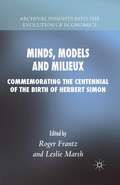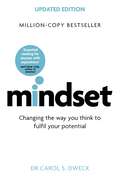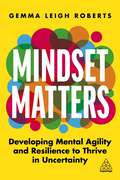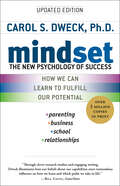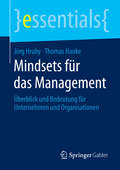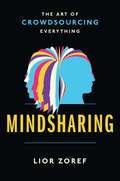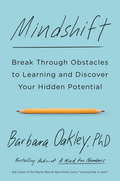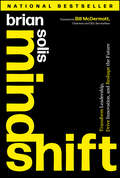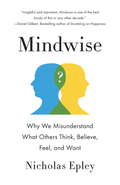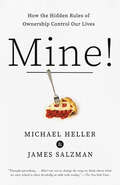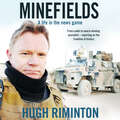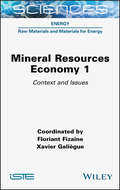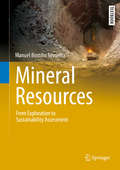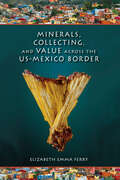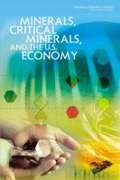- Table View
- List View
Minds Over Meetings: A Personal Perspective on Wellness in the Workplace
by Kody GreenHow to manage your mental health at work and create supportive environments for teams you lead Drawing on popular influencer Kody Green's inspirational story as a diagnosed person with schizophrenia who succeeded in finding and maintaining a job across diverse industry sectors including production, distribution, office settings, and management, Minds Over Meetings: A Personal Perspective on Wellness in the Workplace provides practical strategies for fostering an understanding, empathetic, and supportive and inclusive work environment as well as self-care and coping strategies to help all professionals manage their mental health better at work. Backed by the latest research findings in the field and emphasizing the vital role of open and honest communication, Green explores topics including: Finding available accommodations through employee assistance programs (EAP) and the Family and Medical Leave Act (FMLA) Retaining talent in the workplace by promoting education and fighting stigma Building relationships between friends and colleagues to strengthen teamwork Minds Over Meetings: A Personal Perspective on Wellness in the Workplace earns a well-deserved spot on the bookshelves of all individuals seeking to thrive in the workplace through effective management of their mental health, along with all managers and business leaders seeking to create an open and supportive environment to improve worker wellbeing.
Minds Unveiled: Exploring the Effects of Generative AI on Business Behavior
by Hemachandran K Raul V. RodriguezThis book demonstrates how generative artificial intelligence (AI), a form of sophisticated AI technology, is transforming our knowledge of how the human mind functions in relation to business leadership and decision-making. It describes the most recent findings and applications of generative AI in psychology. The book explains the relationships between language, thinking, and behavior as well as how AI may aid in our understanding of learning, decision-making, and problem-solving. In addition, it discusses the significance of applying AI properly and ethically. This book provides a comprehensive overview of how AI is increasing our understanding of the mind and how it impacts each of us professionally.
Minds Viewed Globally: A Personal Introduction--An Overview of the Five Minds for the Future
by Howard GardnerThe world of the future-with its ubiquitous search engines, robots, and other computational devices-will demand capacities that until now have been mere options. To meet this new world on its own terms, we should begin to cultivate these capacities now. This chapter describes the five minds that will be in demand in the future.
Minds Wide Shut: How the New Fundamentalisms Divide Us
by Gary Saul Morson Morton SchapiroA timely exploration of intellectual dogmatism in politics, economics, religion, and literature—and what can be done to fight itPolarization may be pushing democracy to the breaking point. But few have explored the larger, interconnected forces that have set the stage for this crisis: namely, a rise in styles of thought, across a range of fields, that literary scholar Gary Saul Morson and economist Morton Schapiro call “fundamentalist.” In Minds Wide Shut, Morson and Schapiro examine how rigid adherence to ideological thinking has altered politics, economics, religion, and literature in ways that are mutually reinforcing and antithetical to the open-mindedness and readiness to compromise that animate democracy. In response, they propose alternatives that would again make serious dialogue possible.Fundamentalist thinking, Morson and Schapiro argue, is not limited to any one camp. It flourishes across the political spectrum, giving rise to dueling monologues of shouting and abuse between those who are certain that they can’t be wrong, that truth and justice are all on their side, and that there is nothing to learn from their opponents, who must be evil or deluded. But things don’t have to be this way. Drawing on thinkers and writers from across the humanities and social sciences, Morson and Schapiro show how we might begin to return to meaningful dialogue through case-based reasoning, objective analyses, lessons drawn from literature, and more.The result is a powerful invitation to leave behind simplification, rigidity, and extremism—and to move toward a future of greater open-mindedness, moderation, and, perhaps, even wisdom.
Minds Wide Shut: How the New Fundamentalisms Divide Us
by Gary Saul MorsonA timely exploration of intellectual dogmatism in politics, economics, religion, and literature—and what can be done to fight itPolarization may be pushing democracy to the breaking point. But few have explored the larger, interconnected forces that have set the stage for this crisis: namely, a rise in styles of thought, across a range of fields, that literary scholar Gary Saul Morson and economist Morton Schapiro call “fundamentalist.” In Minds Wide Shut, Morson and Schapiro examine how rigid adherence to ideological thinking has altered politics, economics, religion, and literature in ways that are mutually reinforcing and antithetical to the open-mindedness and readiness to compromise that animate democracy. In response, they propose alternatives that would again make serious dialogue possible.Fundamentalist thinking, Morson and Schapiro argue, is not limited to any one camp. It flourishes across the political spectrum, giving rise to dueling monologues of shouting and abuse between those who are certain that they can’t be wrong, that truth and justice are all on their side, and that there is nothing to learn from their opponents, who must be evil or deluded. But things don’t have to be this way. Drawing on thinkers and writers from across the humanities and social sciences, Morson and Schapiro show how we might begin to return to meaningful dialogue through case-based reasoning, objective analyses, lessons drawn from literature, and more.The result is a powerful invitation to leave behind simplification, rigidity, and extremism—and to move toward a future of greater open-mindedness, moderation, and, perhaps, even wisdom.
Minds, Brains, and Doxa for Inclusive Entrepreneurship: Entrepreneurial Ecosystems for Diverse Entrepreneurs (International Studies in Entrepreneurship #47)
by Kirsten Mikkelsen Annika WolfThis book explores ways in which inclusive entrepreneurship enhances bottom-up entrepreneurial activity for economic and societal transformation, particularly in remote areas. It focuses on the role of stakeholders in shaping a successful entrepreneurial ecosystem (doxa) and how entrepreneurial ecosystems in larger cities and urban regions differ from those in rural regions, which often have weaker economic infrastructures. It examines the relationship between the internal and external entrepreneurial ecosystems in higher education for fostering entrepreneurial mindsets. Topics such as women and diversity in entrepreneurship; social entrepreneurship and entrepreneurial education are explored. This integration of inclusive and emancipatory aspects in entrepreneurship research and practice is of benefit to researchers, scholars, academics, practitioners, and policy makers interested in and have a passion for (re)building entrepreneurial ecosystems.
Minds, Models and Milieux: Commemorating the Centennial of the Birth of Herbert Simon (Archival Insights into the Evolution of Economics)
by Leslie Marsh Roger FrantzThis book is a collection of specially-commissioned chapters from philosophers, economists, political and behavioral economists, cognitive and organizational psychologists, computer scientists, sociologists and permutations thereof as befits the polymathic subject of this book: Herbert Simon. The tripartite of the title, Minds, Models and Milieux, connotes the three inextricably linked areas to which Herbert Simon made the most distinguished of contributions. 'Minds' connotes Simon's abiding interest in theorizing human behavior, rationality, and decision-making; 'Models' connotes his extensive computer simulation work in the service of his interest in understanding minds, but also in the service of minds that are situated in a complex social 'Milieux'. This collection while intended to commemorate the centenary of Simon's birth simultaneously offers a timely reassessment of some of his central insights and illustrates the exponentially growing interest in Simon's work from beyond the usual disciplines and constituencies.
Minds, Models and Milieux: Commemorating the Centennial of the Birth of Herbert Simon (Archival Insights into the Evolution of Economics)
by Leslie Marsh Roger FrantzThis book is a collection of specially-commissioned chapters from philosophers, economists, political and behavioral economists, cognitive and organizational psychologists, computer scientists, sociologists and permutations thereof as befits the polymathic subject of this book: Herbert Simon. The tripartite of the title, Minds, Models and Milieux, connotes the three inextricably linked areas to which Herbert Simon made the most distinguished of contributions. 'Minds' connotes Simon's abiding interest in theorizing human behavior, rationality, and decision-making; 'Models' connotes his extensive computer simulation work in the service of his interest in understanding minds, but also in the service of minds that are situated in a complex social 'Milieux'.This collection while intended to commemorate the centenary of Simon's birth simultaneously offers a timely reassessment of some of his central insights and illustrates the exponentially growing interest in Simon's work from beyond the usual disciplines and constituencies.
Mindset - Updated Edition: Changing The Way You think To Fulfil Your Potential
by Dr Carol DweckWorld-renowned Stanford University psychologist Carol Dweck, in decades of research on achievement and success, has discovered a truly groundbreaking idea-the power of our mindset.Dweck explains why it's not just our abilities and talent that bring us success-but whether we approach them with a fixed or growth mindset. She makes clear why praising intelligence and ability doesn't foster self-esteem and lead to accomplishment, but may actually jeopardize success. With the right mindset, we can motivate our kids and help them to raise their grades, as well as reach our own goals-personal and professional. Dweck reveals what all great parents, teachers, CEOs, and athletes already know: how a simple idea about the brain can create a love of learning and a resilience that is the basis of great accomplishment in every area.
Mindset Matters: Developing Mental Agility and Resilience to Thrive in Uncertainty
by Gemma Leigh RobertsIf businesses can be agile to survive in an uncertain world, so can you. The future of work requires you to move flexibly and quickly to react to change; that's where your mindset matters. Who wouldn't want to know how to best navigate the choppy waters of change? Resilience is the skill to master for the future of work. The capacity to overcome adversity and, crucially, to learn from experiences and grow, resilience is the tool to have in your business leadership arsenal. From an individual perspective, it will lead to better performance and wellbeing, and for your team, you can positively affect change and build a culture of resilience that permeates your business. In Mindset Matters chartered psychologist and star LinkedIn Learning instructor, Gemma Leigh Roberts, teaches you why mental agility is the key ingredient to developing resilience and how to achieve it. This book will teach you the principles of thriving in uncertainty. From changing perspectives, emotional flexibility, a growth mindset, to cementing your mindset shift in others and your team, you will learn research-backed strategies that will allow you to grow your resilience and use change to your advantage. With energy and speed, you can embrace moments of pivots and ensure you and your business bounce back from whatever the world throws at you next.
Mindset: The New Psychology of Success
by Carol S. DweckWorld-renowned Stanford University psychologist Carol Dweck, in decades of research on achievement and success, has discovered a truly groundbreaking idea--the power of our mindset.In this brilliant book, Dweck shows how success in school, work, sports, the arts, and almost every area of human endeavor can be dramatically influenced by how we approach our goals. People with a fixed mindset--those who believe that abilities are fixed--are far less likely to flourish than those with a growth mindset--those who believe that abilities can be developed through hard work, good strategies, and mentorship. Mindset reveals how great parents, teachers, managers, and athletes can put this idea to use to foster outstanding accomplishment. Praise for Mindset"A good book is one whose advice you believe. A great book is one whose advice you follow. This is a book that can change your life, as its ideas have changed mine."--Robert J. Sternberg, co-author of Teaching for Wisdom, Intelligence, Creativity, and Success "An essential read for parents, teachers [and] coaches . . . as well as for those who would like to increase their own feelings of success and fulfillment."--Library Journal (starred review) "Everyone should read this book."--Chip Heath and Dan Heath, authors of Made to Stick "One of the most influential books ever about motivation."--Po Bronson, author of NurtureShock "If you manage people or are a parent (which is a form of managing people), drop everything and read Mindset."--Guy Kawasaki, author of The Art of the Start 2.0From the Hardcover edition.
Mindsets für das Management: Überblick und Bedeutung für Unternehmen und Organisationen (essentials)
by Jörg Hruby Thomas HankeWir alle sind begrenzt, was die Aufnahme von Informationen angeht. Wie selektiert das Management die richtigen Personen mit den richtigen Fähigkeiten, die zur richtigen Zeit am richtigen Ort sind, um dem großen Konkurrenzkampf am Markt gewachsen zu sein? Die Mitarbeiter eines Unternehmens müssen in der heutigen dynamischen Geschäftswelt mit einer Menge an unterschiedlichen Graden von Komplexität, Mehrdeutigkeit und Diversität umgehen. Dazu benötigt es die Entschlüsselung der geistigen Denk-DNA, des sogenannten Mindset. Doch was ist eigentlich ein Mindset und wie kann man dieses erheben und messen?
Mindsharing
by Lior ZorefWhether we need to make better financial choices, find the love of our life, or transform our career, crowdsourcing is the key to making quicker, wiser, more objective decisions. But few of us even come close to tapping the full potential of our online personal networks. Lior Zoref offers proven guidelines for applying what he calls "mind sharing" in new ways. For instance, he shows how a mother's Facebook update saved the life of a four-year-old boy, and how a manager used LinkedIn to create a year's worth of market research in less than a day. Zoref's clients are using his techniques to innovate and problem-solve in record time. Now he reveals how crowdsourcing has the ability to supercharge our thinking and upgrade every aspect of our lives.
Mindshift: Break Through Obstacles to Learning and Discover Your Hidden Potential
by Barbara OakleyMindshift reveals how we can overcome stereotypes and preconceived ideas about what is possible for us to learn and become. At a time when we are constantly being asked to retrain and reinvent ourselves to adapt to new technologies and changing industries, this book shows us how we can uncover and develop talents we didn’t realize we had—no matter what our age or background. We’re often told to “follow our passions.” But in Mindshift, Dr. Barbara Oakley shows us how we can broaden our passions. Drawing on the latest neuroscientific insights, Dr. Oakley shepherds us past simplistic ideas of “aptitude” and “ability,” which provide only a snapshot of who we are now—with little consideration about how we can change. Even seemingly “bad” traits, such as a poor memory, come with hidden advantages—like increased creativity. Profiling people from around the world who have overcome learning limitations of all kinds, Dr. Oakley shows us how we can turn perceived weaknesses, such as impostor syndrome and advancing age, into strengths. People may feel like they’re at a disadvantage if they pursue a new field later in life; yet those who change careers can be fertile cross-pollinators: They bring valuable insights from one discipline to another. Dr. Oakley teaches us strategies for learning that are backed by neuroscience so that we can realize the joy and benefits of a learning lifestyle. Mindshift takes us deep inside the world of how people change and grow. Our biggest stumbling blocks can be our own preconceptions, but with the right mental insights, we can tap into hidden potential and create new opportunities.From the Trade Paperback edition.
Mindshift: Transform Leadership, Drive Innovation, and Reshape the Future
by Brian SolisNational Bestseller!Rethink Your Mindset to Reshape the FutureEvery company needs leaders who can spot and seize on opportunities at a moment’s notice. Every organization needs leaders who can rally teams together around new opportunities. Those who can see important, emerging trends foresee the coming disruption and harness those forces, translate them into actionable insights and motivation to fuel their company’s march into the future rather than ignoring or running or hiding from opportunities. In Mindshift: Transform Leadership, Drive Innovation, and Reshape the Future, technologist, strategist, keynote speaker, and award-winning author Brian Solis, Head of Global Innovation at ServiceNow, draws on his experience of leading initiatives that drive innovation and business transformation to deliver the empowering message that this is the time to change the world for the better. And that change starts with you. In this book, you’ll discover why legacy leadership continues to miss the mark and fail to adequately account for change and innovation, causing people to miss the winds of opportunity or threats of disruption until it’s too late. Let this inspire, not frustrate you. Within these pages, you’ll gain access to the tools, insights, and lessons you need to become an unstoppable leader, regardless of your roles. You’ll learn how to: Adapt for a post-industrial, AI-first world Find direction in uncertainty Spot and prioritize emerging trends Develop, spark, and embrace innovative ideas that create new value Learn to thrive in this new and shifting future Mindshift explains how you can make the mental shift to see past industrial-era business-as-usual mindsets, to become the visionary and voice for a future that doesn’t yet exist. Embracing a mindshift opens your potential to new possibilities, breaking the shackles of the status quo, and unlocking alternative, more meaningful destinies. Mindshift is perfect for anyone who knows a better future is possible, and who wants to make an impact, to reshape the modern business landscape, and develop the skills they need to thrive in a perpetual state of uncertainty. Mindshift is a can’t-miss resource for managers, executives, entrepreneurs, and anyone who cares about the future, their destiny, and the role they want to play in shaping tomorrow.
Mindwise
by Nicholas EpleyYou are a mind reader, born with an extraordinary ability to understand what others think, feel, believe, want, and know. It's a sixth sense you use every day, in every personal and professional relationship you have. At its best, this ability allows you to achieve the most important goal in almost any life: connecting, deeply and intimately and honestly, to other human beings. At its worst, it is a source of misunderstanding and unnecessary conflict, leading to damaged relationships and broken dreams. How good are you at knowing the minds of others? How well can you guess what others think of you, know who really likes you, or tell when someone is lying? How well do you really understand the minds of those closest to you, from your spouse to your kids to your best friends? Do you really know what your coworkers, employees, competitors, or clients want?In this illuminating exploration of one of the great mysteries of the human mind, University of Chicago psychologist Nicholas Epley introduces us to what scientists have learned about our ability to understand the most complicated puzzle on the planet--other people--and the surprising mistakes we so routinely make. Why are we sometimes blind to the minds of others, treating them like objects or animals? Why do we sometimes talk to our cars, or the stars, as if there is a mind that can hear us? Why do we so routinely believe that others think, feel, and want what we do when, in fact, they do not? And why do we believe we understand our spouses, family, and friends so much better than we actually do? Mindwise will not turn other people into open books, but it will give you the wisdom to revolutionize how you think about them--and yourself. From the Hardcover edition.
Mindwise
by Nicholas EpleyYou are a mind reader, born with an extraordinary ability to understand what others think, feel, believe, want, and know. It's a sixth sense you use every day, in every personal and professional relationship you have. At its best, this ability allows you to achieve the most important goal in almost any life: connecting, deeply and intimately and honestly, to other human beings. At its worst, it is a source of misunderstanding and unnecessary conflict, leading to damaged relationships and broken dreams. How good are you at knowing the minds of others? How well can you guess what others think of you, know who really likes you, or tell when someone is lying? How well do you really understand the minds of those closest to you, from your spouse to your kids to your best friends? Do you really know what your coworkers, employees, competitors, or clients want?In this illuminating exploration of one of the great mysteries of the human mind, University of Chicago psychologist Nicholas Epley introduces us to what scientists have learned about our ability to understand the most complicated puzzle on the planet--other people--and the surprising mistakes we so routinely make. Why are we sometimes blind to the minds of others, treating them like objects or animals? Why do we sometimes talk to our cars, or the stars, as if there is a mind that can hear us? Why do we so routinely believe that others think, feel, and want what we do when, in fact, they do not? And why do we believe we understand our spouses, family, and friends so much better than we actually do? Mindwise will not turn other people into open books, but it will give you the wisdom to revolutionize how you think about them--and yourself. From the Hardcover edition.
Mindwise
by Nicholas EpleyYou are a mind reader, born with an extraordinary ability to understand what others think, feel, believe, want, and know. It's a sixth sense you use every day, in every personal and professional relationship you have. At its best, this ability allows you to achieve the most important goal in almost any life: connecting, deeply and intimately and honestly, to other human beings. At its worst, it is a source of misunderstanding and unnecessary conflict, leading to damaged relationships and broken dreams. How good are you at knowing the minds of others? How well can you guess what others think of you, know who really likes you, or tell when someone is lying? How well do you really understand the minds of those closest to you, from your spouse to your kids to your best friends? Do you really know what your coworkers, employees, competitors, or clients want?In this illuminating exploration of one of the great mysteries of the human mind, University of Chicago psychologist Nicholas Epley introduces us to what scientists have learned about our ability to understand the most complicated puzzle on the planet--other people--and the surprising mistakes we so routinely make. Why are we sometimes blind to the minds of others, treating them like objects or animals? Why do we sometimes talk to our cars, or the stars, as if there is a mind that can hear us? Why do we so routinely believe that others think, feel, and want what we do when, in fact, they do not? And why do we believe we understand our spouses, family, and friends so much better than we actually do? Mindwise will not turn other people into open books, but it will give you the wisdom to revolutionize how you think about them--and yourself. From the Hardcover edition.
Mindwise
by Nicholas EpleyYou are a mind reader, born with an extraordinary ability to understand what others think, feel, believe, want, and know. It's a sixth sense you use every day, in every personal and professional relationship you have. At its best, this ability allows you to achieve the most important goal in almost any life: connecting, deeply and intimately and honestly, to other human beings. At its worst, it is a source of misunderstanding and unnecessary conflict, leading to damaged relationships and broken dreams. How good are you at knowing the minds of others? How well can you guess what others think of you, know who really likes you, or tell when someone is lying? How well do you really understand the minds of those closest to you, from your spouse to your kids to your best friends? Do you really know what your coworkers, employees, competitors, or clients want? In this illuminating exploration of one of the great mysteries of the human mind, University of Chicago psychologist Nicholas Epley introduces us to what scientists have learned about our ability to understand the most complicated puzzle on the planet--other people--and the surprising mistakes we so routinely make. Why are we sometimes blind to the minds of others, treating them like objects or animals? Why do we sometimes talk to our cars, or the stars, as if there is a mind that can hear us? Why do we so routinely believe that others think, feel, and want what we do when, in fact, they do not? And why do we believe we understand our spouses, family, and friends so much better than we actually do? Mindwise will not turn other people into open books, but it will give you the wisdom to revolutionize how you think about them--and yourself. From the Hardcover edition.
Mine!: How the Hidden Rules of Ownership Control Our Lives
by James Salzman Michael A. HellerA hidden set of rules governs who owns what--explaining everything from whether you can recline your airplane seat to why HBO lets you borrow a password illegally--and in this lively and entertaining guide, two acclaimed law professors reveal how things become "mine.""Mine" is one of the first words babies learn. By the time we grow up, the idea of ownership seems natural, whether buying a cup of coffee or a house. But who controls the space behind your airplane seat: you reclining or the squished laptop user behind? Why is plagiarism wrong, but it's okay to knock-off a recipe or a dress design? And after a snowstorm, why does a chair in the street hold your parking space in Chicago, but in New York you lose the space and the chair?Mine! explains these puzzles and many more. Surprisingly, there are just six simple stories that everyone uses to claim everything. Owners choose the story that steers us to do what they want. But we can always pick a different story. This is true not just for airplane seats, but also for battles over digital privacy, climate change, and wealth inequality. As Michael Heller and James Salzman show--in the spirited style of Freakonomics, Nudge, and Predictably Irrational--ownership is always up for grabs.With stories that are eye-opening, mind-bending, and sometimes infuriating, Mine! reveals the rules of ownership that secretly control our lives.
Minefields: A life in the news game - the bestselling memoir of Australia's legendary foreign correspondent
by Hugh RimintonMinefields is a compelling exploration of a foreign correspondent's life - proof of Hugh's belief that 'if you go looking for trouble, you'll probably find it'.Over nearly forty years as a journalist and foreign correspondent, Hugh Riminton has been shot at, blown up, threatened with deportation and thrown in jail. He has reported from nearly fifty countries, witnessed massacres in Africa, wars and conflicts on four continents, and every kind of natural disaster.It has been an extraordinary life. From a small-town teenager with a drinking problem, cleaning rat cages for a living, to a multi-award-winning international journalist reporting to an audience of 300 million people, Hugh has been a frontline witness to our times. From genocide in Africa to the Indian Ocean tsunami, from wars in Iraq and Afghanistan to slave-buying in Sudan, Hugh has seen the best and worst of human behaviour. In Australia, he has covered political dramas, witnessed the Port Arthur massacre and the Thredbo disaster and broken a major national scandal. His work helped force half a dozen government inquiries. His story is entertaining, deeply personal and quietly wise.'An impressive career. His story is a triumph of substance over style.' Sydney Morning Herald'Hugh is an icon of Australian journalism' Michael Ware, former Iraq correspondent for TIME and CNN
Mineral Resource Economics 1
by Florian Fizaine Xavier GaliegueThe constant increase in the consumption of mineral resources, as well as the growing awareness of their exploitation, is causing deep concern within the scientific community. This concern is justified by the fact that the energy transition will increase the pressure on these resources, as renewable energies require an increased and more diversified quantity of mineral materials.This book presents an overview of the exploitation of these mineral resources, where the natural, regulatory and environmental constraints interfere with economic, financial and geopolitical interests. By mobilizing the fields of the humanities, geosciences and engineering, it also analyzes the challenges that the energy transition will encounter, challenges related to the contradictory effects that the acceleration of the extraction of these resources will have on their physical availability, the economies that exploit them and the populations that live off of them
Mineral Resources
by Manuel Bustillo RevueltaThis comprehensive textbook covers all major topics related to the utilization of mineral resources for human activities. It begins with general concepts like definitions of mineral resources, mineral resources and humans, recycling mineral resources, distribution of minerals resources across Earth, and international standards in mining, among others. Then it turns to a classification of mineral resources, covering the main types from a geological standpoint. The exploration of mineral resources is also treated, including geophysical methods of exploration, borehole geophysical logging, geochemical methods, drilling methods, and mineral deposit models in exploration. Further, the book addresses the evaluation of mineral resources, from sampling techniques to the economic evaluation of mining projects (i. e. types and density of sampling, mean grade definition and calculation, Sichel's estimator, evaluation methods - classical and geostatistical, economic evaluation - NPV, IRR, and PP, estimation of risk, and software for evaluating mineral resources). It subsequently describes key mineral resource exploitation methods (open pit and underground mining) and the mineral processing required to obtain saleable products (crushing, grinding, sizing, ore separation, and concentrate dewatering, also with some text devoted to tailings dams). Lastly, the book discusses the environmental impact of mining, covering all the aspects of this very important topic, from the description of diverse impacts to the environmental impact assessment (EIA), which is essential in modern mining projects.
Minerals, Collecting, and Value across the US-Mexico Border
by Elizabeth Emma Ferry“A jewel to those interested in ore mining, mineral collecting and mineralogy, or the anthropology of value.” —American EthnologistAnthropologist Elizabeth Emma Ferry traces the movement of minerals as they circulate from Mexican mines to markets, museums, and private collections on both sides of the United States-Mexico border. She describes how and why these byproducts of ore mining come to be valued by people in various walks of life as scientific specimens, religious offerings, works of art, and luxury collectibles. The story of mineral exploration and trade defines a variegated transnational space, shedding new light on the complex relationship between these two countries—and on the process of making value itself.“A novel contribution to the anthropology of natural resources.” —Journal of Latin American and Caribbean Anthropology“Highly recommended.” —Choice
Minerals, Critical Minerals, And The U.s. Economy
by National Research Council of the National AcademiesMinerals are part of virtually every product we use. Common examples include copper used in electrical wiring and titanium used to make airplane frames and paint pigments. The Information Age has ushered in a number of new mineral uses in a number of products including cell phones (e.g., tantalum) and liquid crystal displays (e.g., indium). For some minerals, such as the platinum group metals used to make cataytic converters in cars, there is no substitute. If the supply of any given mineral were to become restricted, consumers and sectors of the U.S. economy could be significantly affected. Risks to minerals supplies can include a sudden increase in demand or the possibility that natural ores can be exhausted or become too difficult to extract. Minerals are more vulnerable to supply restrictions if they come from a limited number of mines, mining companies, or nations. Baseline information on minerals is currently collected at the federal level, but no established methodology has existed to identify potentially critical minerals. This book develops such a methodology and suggests an enhanced federal initiative to collect and analyze the additional data needed to support this type of tool.
